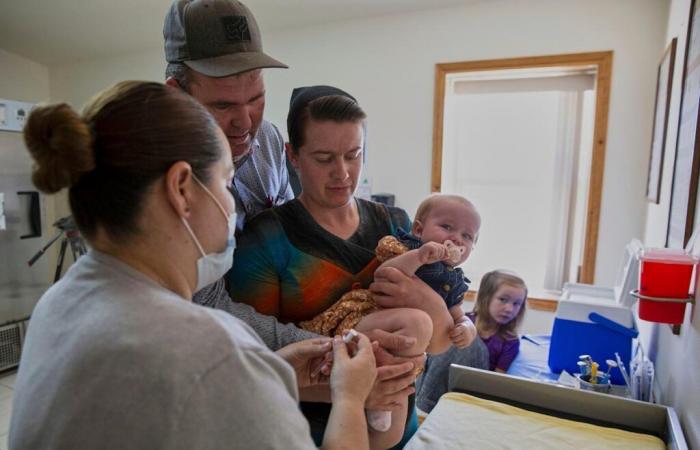Cuauhtémoc, Mexico (AP) – In a rankled Nissan Blanco, nurse Sandra Aguirre and her vaccination team pass through apples orchards and corn fields that extend to the desert horizon. Aguirre goes home with a portable fridge with measles vaccines. In one of the largest Mennonite communities in Latin America, he knows that many will refuse to vaccinate or even open the door. But some will ask questions, and a few could accept getting vaccinated on the spot.
“We are here every day,” said Aguirre, stopping to call an empty farm in search of residents. “To gain the confidence of the Mennonites, as are very reserved people, very closed people, you have to arrive with them (and) kindly show their face.”
Aguirre’s work is part of a campaign of the Health authorities throughout the country to contain the greatest measles outbreak recorded in Mexico in decades, while cases increase not only here but also in the United States and Canada. In Mexico, the contagios have concentrated in the Mennonite community – which is skeptical of the vaccines and distrust of the authorities – in the northern border state of Chihuahua.
The authorities affirm that the results of their campaign along with the Mennonite leaders have been disparate: they talk about tens of thousands of new vaccinations in Chihuahua, but infections have shot and extended beyond the community to indigenous populations, among others.
Federal officials have documented 922 cases and a death in Chihuahua. Authorities, health workers and local leaders say that these figures are likely to be below the real ones, and point to misinformation about vaccines and endemic distrust of the authorities as their greatest obstacles.
Located on the outskirts of the small city of Cuauhtémoc, the Menonite settlement extends over about 40 kilometers (25 miles). With 23,000 residents, it is one of Cuauhtémoc’s main economic engines, but it is an isolated place where families remain by themselves. Some have resorted to social networks and Anti -Vacunas Websites to inform themselves. Others use technology little but visit relatives in the United States, where they also listen to erroneous information, which then disseminates mouth to mouth.
Chihuahua is an especially worrying place, according to the authorities, since as a border state, the risk that this preventable disease continues to spread internationally and affects the most vulnerable is high.
“We have a great flow of people,” said Alexis Hernández, a health officer of Cuauhtémoc. “That complicates us very much.”
The spread of measles in Mexico
Mexico considered measles eradicated in 1998. But its virus vaccination rate was around 76% in 2023, according to the World Health Organization, less than in previous years and well below the 95% that experts claim that it is needed to avoid outbreaks.
The current outbreak of Mexico began in March. The authorities rake their origin to a non -vaccinated eight -year -old Mennonite who visited relatives in Seminole, Texas, in the epicenter of the outbreak in the United States.
The cases quickly spread among the Mennonite community in Chihuahua – with 46,000 members – through schools and churches, according to religious and health leaders. From there, they explained, passed to the workers of the orchards and the cheese plants.
Gloria Elizabeth Vega, a single mother from the Raremuri indigenous community, became ill in March. As it is vaccinated, she did not think it was measles until she was shredded. His supervisor in the cheese factory, who also contracted the disease, told him that he had to take ten days and discounted 40% of his salary for the week, he said.
It is rare for vaccinated people to contract measles, but the authorities claim that they can represent up to 10% of cases here, although they are milder.
Vega confined in the back of his two -bedroom house, hoping that his daughter and mother, also vaccinated, would not get sick. He wants people to think about others when they consider vaccinating.
“One says ‘I have how to support myself’, but they don’t think if that person with whom they live has support or has someone to help it,” he said.
Vaccination is not mandatory in Mexico. Schools can request vaccination records, but they cannot deny anyone access to education, said Carlos Mateos, spokesman for the Federal Department of Health.
In Chihuahua, some schools began to contact parents to ask for copies of vaccination cards and foster vaccines, said the spokesman of the State Ministry of Health, Rodolfo Cortés.
It is unknown how many in the Mennonite community have been vaccinated, although the drug is safe and has less risks than those of disease complications.
Gabriella Villegas, chief of vaccination in a clinic that deals with measles, estimated that 70% of the community members are not inoculated. Other health authorities pointed out that the vaccination rate is around 50%.
In addition to measles, misinformation spreads
-The Mennonites who talked to The Associated press, most of them in condition of anonymity for fear of reprisals, repeatedly cited misinformation about vaccines. A man described as a hero to the Secretary of Health of the United States, Robert F. Kennedy Jr., who has a long anti -vacunation history and has pointed out that vaccinating is a personal choice.
“I do not accept the vaccine, so easy. Because there is freedom of expression,” said the man, Jacob Goertzen. “If we cannot make our own decisions, then we cannot talk about democracy.”
Hernández, Health Director of Cuauhtémoc, said that external influences influence community’s opinions about vaccines.
“The Mennonite population has a lot of access to the media, to relatives who are in the United States and Canada, and these countries have much more marked myths and there are many more anti -vacussion groups than we have in Mexico,” he said.
During the Aguirre vaccination campaign, a man simply said that people here “prefer to heal in their own way.” A mother described getting sick of measles as a “privilege” and talked about taking her unvaccinated children of 5 and 7 years to a party so that everyone was infected and recovered, a risky tactic that doctors have been reported for some time.
The only death from the disease in Mexico was that of a 31 -year -old Mennonite of the settlement that had high diabetes and blood pressure, underlying conditions that usually complicate the clinical picture.
Vaccination campaigns
The majority of the indigenous population and other communities quickly accepted to vaccinate, according to the authorities to the AP, but in Mennonite areas the teams have to do a more intense job: door -to -door visits, called and monitoring conversations, and involve local leaders.
In the Cuauhtémoc settlement, these leaders are people like Jacob Dyck Penner. As president of the colony, he and other leaders closed the school for two weeks to stop the infections, have made an effort to show residents who are working with health authorities and are promoting vaccination.
In addition, they translate health information into the German bass, the maternal language of the majority in the community. Penner and others help vaccination equipment ensuring that families know how to access health services.
We had to find that form, together with the doctors, not to press people so that they do not feel distrust, so that they themselves had the time to make the decision to accept (the vaccine, “he said.
Doctors report a rise in clinical visits to request measles vaccine and other diseases. Even so, Penner said there will always be a group that rejects them.
For this mother, life is lived up to date
Health officials such as Hernández claim that they are especially concerned with vulnerable populations, including indigenous groups, many of whom have less resources to face the situation.
Vega, the single mother who contracted measles, said that her work in the cheese factory was once a blessing because she offered her health coverage and a stable salary.
But the forced license and salary reduction left it in a complicated situation. Now he lives up to date and wonders how he will pay the invoices: his daughter’s school supplies, lunches, sneakers.
“I have a daughter that I have to maintain,” he said.
___
The videoperiodist of The Associated Press Martín Silva Rey contributed to this office.
___
This story was translated from English by an AP editor with the help of a generative artificial intelligence tool.






